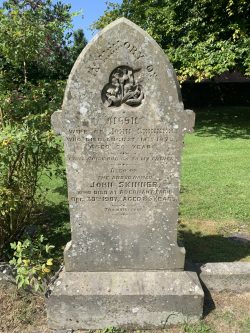John Skinner
Family patriarch and farmer
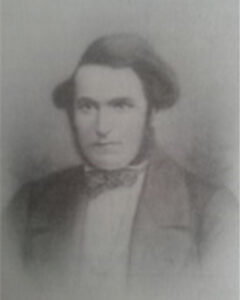
John Skinner was our mother’s 2nd great-grandfather; he plays a pivotal part in Skinner family history. John left the family home in Fife, Scotland to settle in Monmouthshire, Wales, thus creating the Welsh Skinners and the subsequent generations of our family.
John was born in 1822, the first child of John and Jane Skinner (n. Duncan), he became the ninth first-born son to carry the name John. His father was a farmer who hailed from the historic town of Falkland in Fife. John was followed by seven siblings. David 1826, Robert 1829, Isabella 1831, James 1833, Andrew 1835, Alexander 1838 and finally Mary in 1842.
John and Jane settled at Little Balquhomrie Farm near Leslie in Fife where they raised their family. John grew up on the farm with his parents and siblings. He worked with his father from a young age and learnt the family trade. He showed early promise and in his 20’s was already the Secretary of the Leslie District Ploughing Society and took part in plouging matches. Traditionally, he would have been expected to succeed his father and run Little Balquhomrie, but John had other ambitions.
Shortly before the 1851 census was completed John left the farm in Fife to seek new opportunities. He ended up in Newport, Wales where he took a farm management job at Somerton Farm. It is thought that landowners in Wales favoured better educated Scottish farmers for tenancies and this may have influenced John’s decision to settle in Newport.
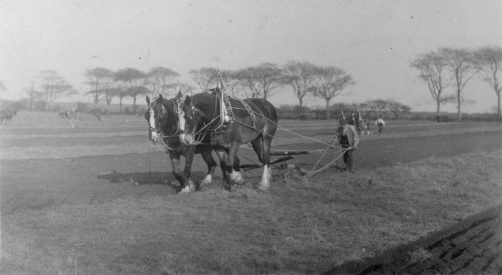
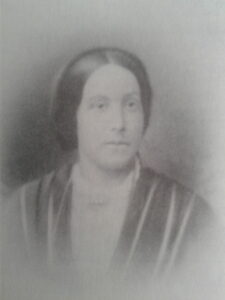
John worked hard at Somerton Farm and after establishing himself he returned home to Falkland to marry. He wed Jessie Farmer on 4th September 1855 at the Parish Church in Leslie. Jessie was from the neighbouring village of Leslie and was one of eight children. Like John, several generations of her family had lived in the local area. Following the wedding the couple travelled to Newport to start their married life.
The 1861 census showed that John and Jessie were living together at Somerton Farm, it was a 150-acre property. John listed his job as Farm Bailiff (farm manager) and was employed by J. Logan esq., the landowner. They were parents to three children and John was managing several farm workers. The land where the farm once stood is now a large housing estate.
John and Jessie went on to have six children. Margaret was first born in 1856, followed by siblings John 1857 (died in infancy), John 1858, Jane 1861, James 1863 and finally Jessie in 1867. The first four children were born at Somerton. John was a proud Scotsman, and all chosen names were taken from previous generations of the Skinner family. All of the children were baptised at their local church and the boys educated at Caerleon Endowed School.
During the early 1860s John secured a prized tenancy at Abernant Farm in Kemeys Inferior, near Caerleon. It was a Parish on the banks of the River Usk, on the high road from Newport to Chepstow, 3 miles north from Llanwern train station. At over 250 acres, Abernant was one of the largest farms in the area and placed John as a farmer of real status. He was said to have cherished the tenancy and was determined to keep it, he succeeded, and it was to be the Skinner home for 80 years. John employed four farm workers to help him develop the business.
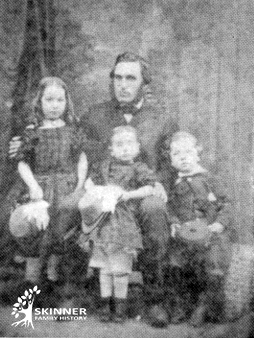
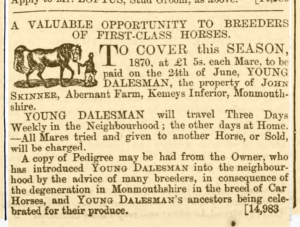
Surviving newspaper reports suggest that the Skinners were hardworking and successful farmers. John won prizes for cattle and poultry breeding, whilst his 17-year-old daughter Margaret won awards for her ducks and geese at the Tredegar Agricultural show 1873. An advert in the Monmouthshire Merlin for a horse called Young Dalesman, showed that John was also breeding first class horses.
John was also known for rising particularly early to milk the cows. The story goes that when foxhunters arrived at the farm before 4am and asked for John, they were told by a servant he hadn’t been seen since breakfast!
In 1868 the Monmouthshire Merlin reported on a ploughing contest at Abernant. It was organised by the “much esteemed agriculturist Mr John Skinner”. The report talked of influential men being drawn to watch the contest and the huge level of local interest in the event. Abernant won two prizes in the ‘swing plough’ category.
It is clear that John was a leading figure in the farming community, respected by his peers and with many friends. It was said that he was a rugged character with strong opinions and liked a drink and a good conversation. It was also recalled that he could be somewhat overbearing with people, including his own children.
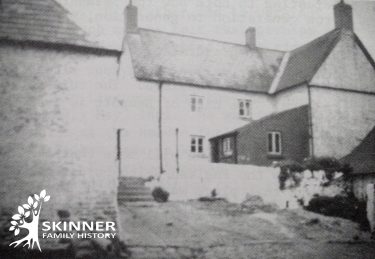
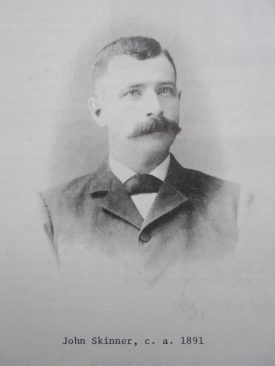
Jessie passed away in 1879, she was only 50 years old. The funeral service was held on 26th August at All Saint’s Church in Kemeys Inferior. Jessie left her husband John and their five children. The following decade was one of great change at the farm. Of John and Jessie’s five children, only James remained at home. Their three daughters had married and left the farm and eldest son John Jr had left for Nebraska, USA in 1881 to start a new life.
Our American relatives have speculated on the reasons for John’s emigration. They believe the decision was based partly on his concerns that the rules of tenancy succession could stop him taking over Abernant Farm. It is also suggested that his father’s overbearing nature and the strained relationship between the two, may have played a part. Having read about both men we would suggest they were very similar and would likely have clashed on a regular basis. We can see that John’s decision to leave Wales for America replicated that of his father, who had himself left his family in Scotland for Wales.
On 13th November 1888 John caused quite a stir in the Skinner family when, at the age of 66, he remarried at All Saint’s Church in Kemeys Inferior. His bride was Mary Collier, a widow who had lived with her previous husband in Cowbridge. Mary was 30 years his junior and working and living at Abernant Farm as a servant. She had three young children, Catherine (8), Daniel (6) and Annie (4), from her previous marriage.
The 1891 census showed John still at Abernant Farm with Mary, James, his two stepchildren and three farm workers. In 1893 John sold off all of his farming stock and left Abernant to live in near-by Cats Ash. Succession issues had been overcome and his son James and his wife Rosa took over the tenancy at Abernant. John was to surprise his family once again by fathering two children with Mary; Alexander was born in 1892 and Isabella in 1894 when John was 72.

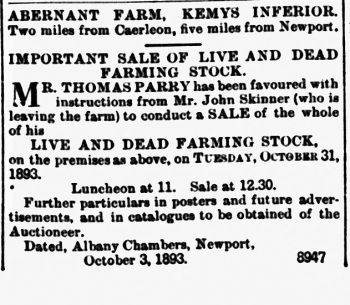
In 1896 John Jr returned home from Nebraska for an extended visit. He arrived in Caerleon on July 16th and stayed until August 14th. John got to see his son several times during his 4-week stay and also attended his leaving party at Penrhos farm in Caerleon. On his return to Nebraska John told his family that his father was a little heavier and greyer but seemed in excellent health and looked younger than when he had last seen him. His father had reportedly told him that he hadn’t been so happy in years.
By the 1901 census, John aged 77, was working part time as a gardener and lived at Number 4 Cats Ash with wife Mary, stepson Daniel and is two children, Alexander was now aged 8 and Isabella aged 4.
In his later years John worked alongside Daniel, teaching him horticulture. John died in his sleep on 30th December 1907; he was 85 years old. He was found by his grandson Reg when he went to call him for breakfast. Abernant Farm was recorded as the place of death.
John was interred, alongside his first wife Jessie on the 3rd January 1908 at All Saint’s Church. However, the medieval church was demolished in 1961 to make way for the A449 and the church remains are now a scheduled ancient monument. When All Saint’s was demolished John and Jessie were reburied in Tredunnock, at St Andrew’s church. The grave is well maintained and has attracted visitors from Scotland and USA, it carries a simple epitaph, “Thy will be done”.
